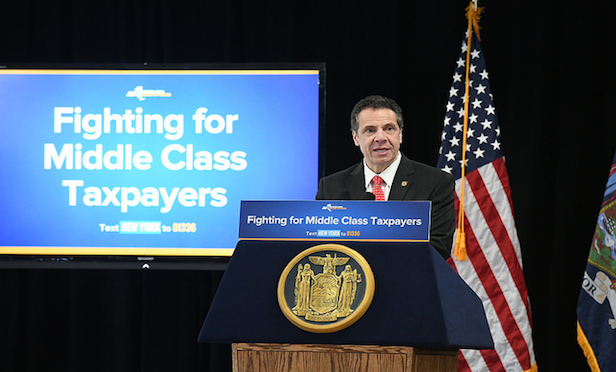© Touchpoint Markets, All Rights Reserved. Request academic re-use from www.copyright.com. All other uses, submit a request to [email protected]. For more inforrmation visit Asset & Logo Licensing.
NY, CT, MD and NJ File Suit Against Tax Reform Law
The long-promised lawsuit filed by New York State Attorney General Barbara D. Underwood specifically points to the federal tax reform law capping the SALT deduction at $10,000 as damaging to state taxpayers. The litigation was joined by the attorneys general of Connecticut, Maryland and New Jersey.
Trending Stories
Events
- Real EstateGlobeSt. ELITE Women of Influence (WOI) 2025July 21, 2025 - DenverGlobeSt. Women of Influence Conference celebrates the women who drive the commercial real estate industry forward.More Information
- Real EstateGlobeSt. Multifamily Fall 2025October 15, 2025 - Los AngelesJoin the industry's top owners, investors, developers, brokers & financiers at THE MULTIFAMILY EVENT OF THE YEAR!More Information
Recommended Stories
Omaha Multifamily Vacancy Spikes as Rent Growth Slows
By Anthony Russo | July 11, 2025
More supply is entering the market.
Houston Industrial Rents Surge by 5% as Demand Remains High
By Anthony Russo | July 11, 2025
Net absorption is expected to remain positive and possibly even rise in the coming months.
Homebuyers Need a $17,000 Raise Just to Afford the Typical Home
By Philippa Maister | July 11, 2025
Affordability issues have left 3.4 million homes available for rent or sale sitting empty.
Resource Center

Report
Sponsored by TheGuarantors
2025 State of Renter Delinquency and Default
Renter default is a critical challenge. This report, based on a survey of 400+ multifamily professionals, reveals key trends, economic drivers, and mitigation gaps to help you build resilience in 2025. You'll gain insights into the root causes of renter default, the operational strains it can put on your portfolio, and strategies you can leverage to protect your investments and maintain stability.

Assessment
Sponsored by Building Engines
CRE Property Management Assessment: Your Building Operations Scorecard
How do your building operations measure up? Use this detailed scorecard to evaluate your operational approach across five key areas.

White Paper
Sponsored by TheGuarantors
5 Strategic Moves to Protect Your Multifamily NOI in 2025's Squeeze
Skyrocketing economic uncertainty means it’s essential for multifamily owners and operators to strengthen risk mitigation capabilities. Discover expert insights from industry experts, including the President of NMHC, to tackle 2025 challenges such as slower lease-ups, cost pressures, renter fraud, high reliance on concessions, and more.





